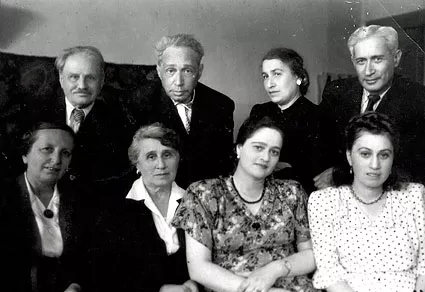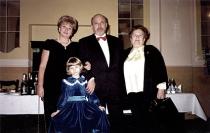Ilia Rozenfeld’s father Alexandr Rozenfeld's family
My father's family: upper row from left to right: Uncle David, my aunt Rosa's husband. She died young. My father Alexandr Rozenfeld, Bertha Zbarskaya, uncle Emmanuel Rozenfeld; lower row: my mother Malka Rozenfeld, Vera Rubinshtein, my cousin sisters Anna Rubinshtein (Vera's daughter) and Anna Pozina (aunt Fania's daughter). This photo was taken in Poltava in 1950 on my mother's birthday. My mother and Vera are wearing fancy white blouses and the girls are wearing colorful crepe I, Ilia Rozenfeld, took this photo at our home.
My grandfather Shymon and grandmother Anna had 12 children, but only nine of them lived. I remember my aunt and uncles' names as they were called at home. Perhaps, they had different names written in their birth certificates or passports: Rosa, born in 1880, Vera, born in 1882, Manya, born in 1885, uncle Emmanuel [called Monia at home], born in 1890, Lubov, born in 1892, Rachil, born in 1894, Fania, born in 1896, and Bertha, born in 1902. My father Alexandr was the forth child. He was born in 1888. The older children were born in Kobelyaki and later the family moved to Poltava.
My grandfather wanted his children to get secular education and implemented this dream. Rosa and Vera finished secondary schools and a midwife school in Poltava. Lubov and Fania finished Medical College in Poltava: Lubov became a dentist and Fania became an obstetrician. Maria, Rachil and Bertha studied in Conservatories: Maria - in Moscow and her sisters - in Petersburg. They became pianists and music teachers. Uncle Emmanuel finished the Coal Industry College and became an engineer.
My father worked in the pharmacy and later he became director of a pharmaceutical school in Poltava. My mother worked and studied in college. My mother went to work as an accountant in prison. She had a kind heart and began to take messages and parcels to prisoners and my father insisted that she quit her job, or she would have been arrested. My mother went to work as a German lecturer in Poltava Construction College where she later became chief of department. Our family was wealthy for this period of time: my mother and father had a good education and were respectable people in the town.
Thanks to my father, our house was a center of the Rozenfeld family gatherings: my father's sisters, their husbands and children. My father's sisters, their husbands and children often got together in our apartment to celebrate birthdays and Soviet holidays. We didn't observe any Jewish traditions or celebrate holidays. I don't remember any Jewish celebrations in my childhood. My parents' friends often visited us. My father recited his poems and Russian and foreign classical poems at their gatherings. My father often went to a book store buying another book each time. We had many My mother read French and German books to remember the languages. There were few books in Yiddish at home. I think they were my grandfather's. I also liked reading. We had a piano. My father never studied music, but he played by hearing.
My father's sister Vera was a midwife. Vera made stocking on a knitting machine working at home. Many women, including my mother, were doing this to earn their living. During the Great Patriotic War Vera and her daughter were in evacuation with us and after the war we returned to Poltava. She died in 1962. Her daughter Anna Rubinshtein became an ophthalmologist. She was single and died in Poltava in 1966.
My father's brother Emmanuel, who had finished a Mine College by then, lived in Kharkov before the early 1930s and then he moved to Moscow. Emmanuel's family, but his son Yuriy, was in Moscow during the Great Patriotic War. Yuriy, born in 1919, was at the front. Emmanuel and his wife Lubov died in 1961, their son Yuriy passed away in 1976. Emmanuel's daughter Anna Rozenfeld, born in 1923, a neuropathologist, is a pensioner and lives in Moscow.















